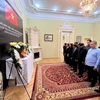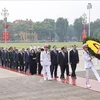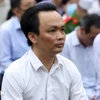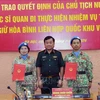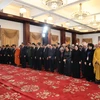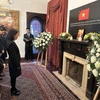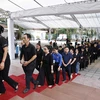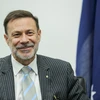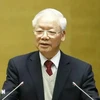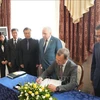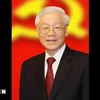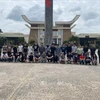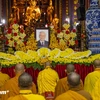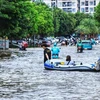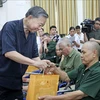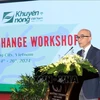Traffic police and land administrators are perceived as the most corrupt officials, according to a survey published on Nov. 20 by the World Bank and the Government Inspectorate of Vietnam.
Tran Duc Luong, deputy inspector general of the Government Inspectorate, said the results of the survey - titled "Corruption from the Perspective of Citizens, Firms and Public Officials" - represent the views of more than 2,600 citizens, 1,058 firms and 1,801 public officials in 10 provinces and five ministries, although these do not necessarily reflect the whole of Vietnam.
Since these surveyed provinces account for 30 percent of the population and produce 65 percent of the GDP of the country, the results are nevertheless compelling, he said.
More than one out of three respondents selected corruption as among the three most serious issues for Vietnam , said James Anderson, a World Bank expert. About 47 percent of surveyed citizens said they had paid unofficial bribes to traffic police while 25 percent said they had to give unofficial payments for health care services and other administrative services.
Meanwhile, enterprises reported paying unofficial bribes most often when using services provided by taxation agencies (33 percent), administration agencies (22 percent), traffic police (16 percent) and customs (16 percent).
Victoria Kwakwa, Country Director of the World Bank in Vietnam , said the system of corruption is fed by both the demand and supply sides, creating a vicious circle of bureaucratic problems and unofficial payments that are demanded or offered to solve those problems. More often than not, those payments are initiated by the supply side.
When survey respondents are asked about why they pay bribes, the most common answer is that the officials intentionally create difficulties or delay solving problems.
Specifically, 63 percent of the surveyed firms said officials intentionally delay solving the firms' requests until they receive bribes, 22 percent of officials said they witnessed other officials intentionally delaying their duties in order to elicit bribes and 29 percent of citizens were forced to pay bribes due to such tactics.
Anderson said that nearly 60 percent of firms and nearly 40 percent of citizens paid bribes immediately to get things done.
The agencies reported to create the most difficulties are also those receiving the most informal payments.
However, among enterprises paying unofficial bribes, a large portion of enterprises actively initiated giving money or gifts.
In more than 70 percent of the cases, the unofficial payments were actively proposed by enterprises and the remainder were demanded by officials. Traffic police and market management agencies top the list of agencies requesting unofficial payments.
The same result can be seen from citizens' responses: around 80 percent of them made such payments for taxation services and health care.
Deputy Inspector General Luong said a number of measures aimed at preventing corruption have been taken in the past few years, but big changes did not occur.
Around 80-90 percent of survey respondents believe that corrupt people are not punished enough, and that not enough attention is paid to improving officials' ethics.
"When the problem of corruption is generated in part by the supply side, the need to change societal attitudes is even clearer," Kwakwa said. "Firms and citizens need to know that they have alternatives to bribery, and where no alternatives exist, Vietnam 's leaders need to create them."
Establishing mechanisms to ensure that these policies are all more fully implemented would help reduce corruption nationwide, she said.-VNA
Tran Duc Luong, deputy inspector general of the Government Inspectorate, said the results of the survey - titled "Corruption from the Perspective of Citizens, Firms and Public Officials" - represent the views of more than 2,600 citizens, 1,058 firms and 1,801 public officials in 10 provinces and five ministries, although these do not necessarily reflect the whole of Vietnam.
Since these surveyed provinces account for 30 percent of the population and produce 65 percent of the GDP of the country, the results are nevertheless compelling, he said.
More than one out of three respondents selected corruption as among the three most serious issues for Vietnam , said James Anderson, a World Bank expert. About 47 percent of surveyed citizens said they had paid unofficial bribes to traffic police while 25 percent said they had to give unofficial payments for health care services and other administrative services.
Meanwhile, enterprises reported paying unofficial bribes most often when using services provided by taxation agencies (33 percent), administration agencies (22 percent), traffic police (16 percent) and customs (16 percent).
Victoria Kwakwa, Country Director of the World Bank in Vietnam , said the system of corruption is fed by both the demand and supply sides, creating a vicious circle of bureaucratic problems and unofficial payments that are demanded or offered to solve those problems. More often than not, those payments are initiated by the supply side.
When survey respondents are asked about why they pay bribes, the most common answer is that the officials intentionally create difficulties or delay solving problems.
Specifically, 63 percent of the surveyed firms said officials intentionally delay solving the firms' requests until they receive bribes, 22 percent of officials said they witnessed other officials intentionally delaying their duties in order to elicit bribes and 29 percent of citizens were forced to pay bribes due to such tactics.
Anderson said that nearly 60 percent of firms and nearly 40 percent of citizens paid bribes immediately to get things done.
The agencies reported to create the most difficulties are also those receiving the most informal payments.
However, among enterprises paying unofficial bribes, a large portion of enterprises actively initiated giving money or gifts.
In more than 70 percent of the cases, the unofficial payments were actively proposed by enterprises and the remainder were demanded by officials. Traffic police and market management agencies top the list of agencies requesting unofficial payments.
The same result can be seen from citizens' responses: around 80 percent of them made such payments for taxation services and health care.
Deputy Inspector General Luong said a number of measures aimed at preventing corruption have been taken in the past few years, but big changes did not occur.
Around 80-90 percent of survey respondents believe that corrupt people are not punished enough, and that not enough attention is paid to improving officials' ethics.
"When the problem of corruption is generated in part by the supply side, the need to change societal attitudes is even clearer," Kwakwa said. "Firms and citizens need to know that they have alternatives to bribery, and where no alternatives exist, Vietnam 's leaders need to create them."
Establishing mechanisms to ensure that these policies are all more fully implemented would help reduce corruption nationwide, she said.-VNA
